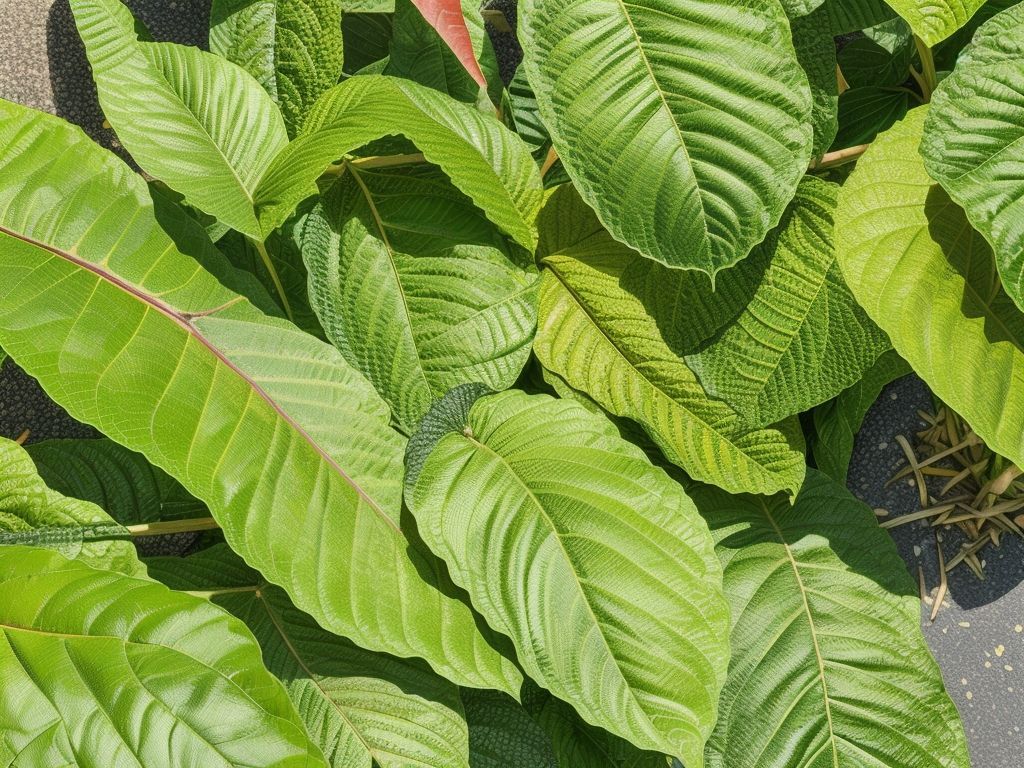Understanding Kratom Withdrawal Symptoms: Causes, Duration, and Management
Kratom withdrawal can be tough to manage. It’s essential to have knowledge about kratom’s effects on the body and to expect what’s to come when you quit using it.
Kratom is a botanic substance from the leaves of Mitragyna speciosa, a tropical tree native to Southeast Asia. It has alkaloids that interact with brain receptors; this causes effects similar to opioids. Kratom is often used for pain relief, relaxation and improving mood.
Using kratom for a long period of time can cause your body to get dependent on it. When you stop or reduce kratom use, withdrawal symptoms may occur. These can include: anxiety, irritability, insomnia, muscle aches, and nausea.
If you want to manage these withdrawal symptoms, there are few tips to consider. Firstly, gradually decreasing kratom use helps the body adjust better and reduces the severity of the symptoms. Secondly, drink lots of water and eat nutritious food to replenish the essential nutrients that kratom depleted.
Also, exercising regularly and practicing relaxation techniques like deep breathing or meditation can help you feel better and reduce stress levels. Finally, getting support and joining support groups can give you a sense of community during this hard time.
Familiarizing yourself with kratom withdrawal symptoms is vital for people wanting to quit. By following these tips, you can make the transition easier and lessen the discomfort.
What is Kratom?
Kratom is a tropical evergreen tree native to Southeast Asia gaining popularity for its potential therapeutic effects. It’s derived from the leaves of the plant and has been traditionally used as a stimulant and pain reliever. Its active compounds, mitragynine and 7-hydroxymitragynine, interact with opioid receptors in the brain, providing an analgesic effect.
This natural herb is gaining recognition for its ability to ease depression and anxiety symptoms. It’s believed to stimulate serotonin and dopamine release – neurotransmitters that help regulate mood. Kratom may also enhance focus and concentration – useful for those dealing with mental fatigue or cognitive challenges.
Kratom also exhibits properties that can aid in managing opioid withdrawal symptoms. Due to its interaction with opioid receptors, it may help reduce cravings and withdrawal discomfort. However, it’s important to note Kratom itself can be addictive if misused or abused.
To ensure a safe and beneficial experience with Kratom, follow guidelines:
- Start with low doses to gauge individual sensitivity and tolerance. Gradually increase dosage as needed while monitoring adverse effects.
Be aware of potential risks and interactions when combining Kratom with other substances, such as prescription medications or alcohol. Consultation with a healthcare professional is recommended before incorporating this herb into your routine.
Understanding Kratom Withdrawal Symptoms
Kratom withdrawal can be hard to comprehend. But, it’s important to gain insight into this. When people quickly quit, or reduce, kratom use they may experience physical and psychological symptoms. These include muscle pain, insomnia, bad temper, worry, and longing for kratom. The intensity and length of these symptoms differ from person to person.
To understand kratom withdrawal further, it’s essential to recognize that the strength of these symptoms depend on things like how often and long the person took kratom, as well as their overall health and reaction to substances. Though these symptoms can be hard and difficult to go through, with the right guidance and help, they can be managed.
One interesting thing to consider is that kratom can produce pleasurable effects that some may seek out regularly. This repeated behavior can lead to psychological reliance. So, understanding the psychological impact of quitting kratom is just as essential as recognizing the physical symptoms of withdrawal.
Pro Tip: Get help from a healthcare provider or addiction specialist. They can build personalized strategies tailored to each individual’s needs in managing kratom withdrawal symptoms properly.
Coping Strategies for Kratom Withdrawal
Coping strategies are essential for managing the tough symptoms of kratom withdrawal. They can help folks get through this difficult stage and take back control of their lives.
- Construct a support system: It’s vital to have a solid support system during kratom withdrawal. Connect with family, friends, or support groups who understand your experience and can give you motivation & advice.
- Be kind to yourself: Self-care is essential in this time. Do activities that make you happy & relaxed, such as exercise, meditation, or hobbies. Prioritizing self-care will help ease symptoms and promote wellness.
- Get professional help: Consider talking to healthcare pros who specialize in addiction and withdrawal management. They can offer personalized advice, meds if needed, and coping techniques tailored to you.
Also, everyone’s experience with kratom withdrawal is unique. Some may benefit from alternative therapies like acupuncture or herbal supplements. Exploring these options with healthcare professionals can lead to better results.
Amanda’s story shows the power of coping strategies during kratom withdrawal. After years of battling her addiction, she decided to get help. By building a support system, exercising, and going to therapy sessions, Amanda succeeded in overcoming her kratom withdrawal symptoms. Her story proves that there is hope and recovery is possible with the right coping strategies.
Remember, coping with kratom withdrawal isn’t easy, but having the right strategies greatly improves the chances of successful recovery. By using these techniques and consulting professionals when necessary, people can get through this challenging time and ultimately take back their lives from addiction.
Tips for Managing Kratom Withdrawal at Home
Managing Kratom Withdrawal at Home can be a challenge. But, there are tips to help. Here’s what you can do:
- Set up a routine. A daily schedule can provide stability and distract from withdrawal symptoms.
- Stay hydrated. Drink plenty of water. It helps flush out toxins from the body.
- Exercise. Physical activity releases endorphins. This reduces anxiety and boosts mood.
- Seek support. Connect with people who understand or have gone through withdrawal. They can provide guidance and encouragement.
- Relax. Try deep breathing, meditation, or yoga. This helps manage stress and promotes relaxation.
Know the details. Understand your triggers and create a supportive environment. This increases your chances of success.
Combining these tips with professional help is key. Everyone’s journey is unique, but seeking support and implementing coping strategies is important for managing withdrawal effectively.
Seeking Medical Help for Severe Withdrawal
Medical assessment is key to understanding the intensity of the withdrawal symptoms. It may necessitate medications or other interventions to handle the discomfort and prevent any further complications.
Personalised treatment plans crafted by medical professionals should be based on individual needs and conditions. Inpatient/ outpatient programmes might be suggested, based on the severity of the withdrawal.
Medical monitoring is essential for a safe withdrawal process, lowering the chances of risks.
Mental health support from healthcare professionals can pinpoint any fundamental issues that may have caused the problem in the first place.
When seeking medical help, keep in mind that everyone’s experience is different. So, personalised care from medical experts is important to ensure a successful recovery.
Tip: Be sure to voice out any concerns and severity of your symptoms to healthcare providers to help them provide an ideal treatment plan for you.
Conclusion
Evaluating the effects of kratom withdrawal can be hard. To address it we need short-term and long-term solutions.
For this, we must take a multi-faceted approach.
- Get professional medical help. Monitoring physical changes and getting guidance is important.
- Holistic methods can help. Exercise helps physical health and manages stress. Relaxation techniques like meditation or deep breathing can calm the mind.
- Joining support groups and seeking therapy is also valuable. Connecting with others who went through this can give emotional support and insights into coping mechanisms. Plus, therapy can help address factors that lead to kratom dependence.
To sum up, kratom withdrawal needs medical, holistic and emotional help. By using these strategies, individuals can manage withdrawal and achieve recovery.
Frequently Asked Questions
1. What are kratom withdrawal symptoms?
Kratom withdrawal symptoms are a set of physical and psychological effects that occur when someone who is dependent on kratom suddenly stops using it.
2. What are the common symptoms of kratom withdrawal?
The common symptoms of kratom withdrawal include irritability, anxiety, restlessness, muscle aches, insomnia, nausea, sweating, and cravings for kratom.
3. How long do kratom withdrawal symptoms last?
The duration of kratom withdrawal symptoms can vary depending on several factors, including the individual’s level of dependence and usage. Generally, acute withdrawal symptoms can last for about a week, while some psychological symptoms may persist for several weeks.
4. Are kratom withdrawal symptoms dangerous?
While kratom withdrawal symptoms can be uncomfortable, they are generally not considered life-threatening. However, some individuals may experience severe symptoms that require medical intervention.
5. How can I manage kratom withdrawal symptoms?
Managing kratom withdrawal symptoms can involve various strategies, including tapering off kratom use gradually, staying hydrated, getting plenty of rest, engaging in regular exercise, and seeking support from healthcare professionals or support groups.
6. Can kratom withdrawal symptoms be prevented?
Kratom withdrawal symptoms can potentially be prevented by using kratom responsibly and in moderation, as prolonged and heavy usage is more likely to lead to dependence. Regular breaks from kratom use and seeking professional help for managing usage can also reduce the risk of experiencing withdrawal symptoms.




Leave a Reply
Want to join the discussion?Feel free to contribute!